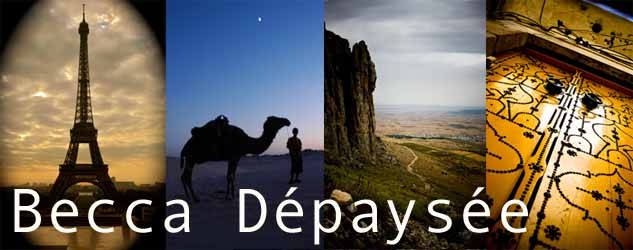 Last Wednesday night I had the fortune to embark on yet another trustfundergrad-payed adventure: an evening at the national Opéra Garnier to see Platée. I had never in my life seen an opera before this night, nor did I have a real strong desire to. My entire knowledge of opera was limited to the word "aria"--which I only know because it's one of those words (other examples: oreo, etna) that show up all the time in crossword puzzles. In my head, opéra meant an elitist crowd and a long show in a language I couldn't understand; overly dramatic, always tragic, and preformed in shrill vibrato by women whose chests quivered in bodices and hoop skirts, opposite men in powdered wigs.
Last Wednesday night I had the fortune to embark on yet another trustfundergrad-payed adventure: an evening at the national Opéra Garnier to see Platée. I had never in my life seen an opera before this night, nor did I have a real strong desire to. My entire knowledge of opera was limited to the word "aria"--which I only know because it's one of those words (other examples: oreo, etna) that show up all the time in crossword puzzles. In my head, opéra meant an elitist crowd and a long show in a language I couldn't understand; overly dramatic, always tragic, and preformed in shrill vibrato by women whose chests quivered in bodices and hoop skirts, opposite men in powdered wigs.Clearly, my vision of opera is outdated by several centuries.
From the moment I stepped into the theater I was in love. The building itself is a jewel, lavish but still somehow still understated. Walking up the central stairs was like waking into another
 era; the hubbub of the street become a reverent murmur, the electric lights of the outside dimmed to a chandelier glow that you could almost imagine was candlelight. Regular Parisians of all ages shed peacoats to reveal evening gowns and suits, strolling arm in arm to a marble balcony to survey the crowd in the lobby below. Inside the actual theater, boxes of red velvet seats were stacked crescent-style around the orchestra and stage, with a giant classic chandelier offset by a more modern Chagall-painted ceiling. The orchestra began, the crowd leaned forward, and the curtain raised to reveal...
era; the hubbub of the street become a reverent murmur, the electric lights of the outside dimmed to a chandelier glow that you could almost imagine was candlelight. Regular Parisians of all ages shed peacoats to reveal evening gowns and suits, strolling arm in arm to a marble balcony to survey the crowd in the lobby below. Inside the actual theater, boxes of red velvet seats were stacked crescent-style around the orchestra and stage, with a giant classic chandelier offset by a more modern Chagall-painted ceiling. The orchestra began, the crowd leaned forward, and the curtain raised to reveal......the audience!

In a beautifully mise-en-abîme beginning (play-within-a-play, or thereabouts), the stage was a mimicry of the seating and a plain-clothes chorus spent the first number being seated by ushers before absurdly climbing and scrambling over and across the very same seats we were in. The story started with a hungover Thespis and some buds of his who decide to put on a play about the Gods. From then on the opera became the play, with the seats splitting further apart and draped by more and more moss in every scene until the stage had completely become the swamp of Platée, and ugly marsh nymph frog queen, played by--get this--a man!
Opera has CROSSDRESSING?!? It was official; I was won over.
Basic plot: in order to teach his wife Juno a lesson about jealousy and Platée a lesson about pride, Jupiter (along with help from henchman Mercury) decides to feign love to Platée and leave her at the alter
 once an enraged Juno shows up and realizes she's been had. In short: absolutely hilarious, with songs, costumes, dances and slapstick that was just plain fun. The audience was laughing the entire time--shattering my illusion of a stuffy, proper crowd, and costumes included frog suits, umbrella tutus for a rain dance, a dress made of sheet-music, Prince-inspired gear for Mercury, and a Bowie-inspired Jupiter. AND the whole thing was in delightfully modern and comprehensible French, with lyrics projected on an LED screen above the stage to make comprehension that much easier.
once an enraged Juno shows up and realizes she's been had. In short: absolutely hilarious, with songs, costumes, dances and slapstick that was just plain fun. The audience was laughing the entire time--shattering my illusion of a stuffy, proper crowd, and costumes included frog suits, umbrella tutus for a rain dance, a dress made of sheet-music, Prince-inspired gear for Mercury, and a Bowie-inspired Jupiter. AND the whole thing was in delightfully modern and comprehensible French, with lyrics projected on an LED screen above the stage to make comprehension that much easier.If I had done my research beforehand, I would have known that Platée is a "ballet buffon"--a comic opera. I had to experience it to believe it, though--I didn't realize that opera knew how to laugh at itself. I also wasn't prepared for the elegance of the experience: the full orchestra; the dance; the amazingly resonant voices, each unique and expressive. I left the Opéra that night with the same peaceful feeling I get in a museum or a bookstore--that saturation with art that makes me feel proud to be human. We may spend most of our lives fucking up, but every once and again someone manages to glimpse the sublime and channel it to the masses, creating and proliferating beauty.
(And THAT is why I study literature.)

No comments:
Post a Comment